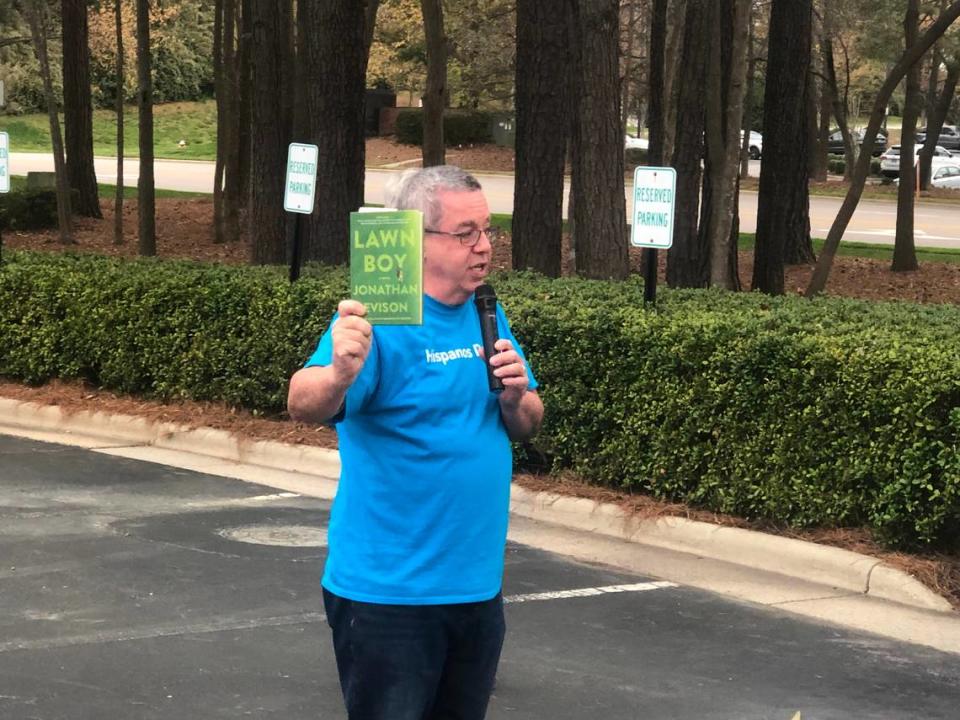Amid growing efforts in NC to challenge books, schools emphasize Banned Books Week
Schools across North Carolina and the nation marked Banned Books Week this month at a time when there’s growing scrutiny over what books are available in schools for students to read.
Recently released reports show that the number of school book challenges is rising, with titles involving LGBTQ characters or people of color often among those being singled out. Some educators say they’re trying to fight for intellectual freedom and to ensure students have access to books that reflect their diverse backgrounds.
“The book banning that is happening right now is not about the books,” said Julie Stivers, librarian at Mt. Vernon Middle School in Raleigh. “It is about discriminating and othering marginalized communities.”
But some parents say what’s happening is that families are responding to what they call “obscene” and “pornographic” books in school libraries. Critics have focused on scenes, and in some cases images, of young people engaging in sexual activity in various books.
“It has nothing to do with race,” said Julie Page, president of the Wake County chapter of Moms for Liberty. “It has nothing to do with LGBTQ. It has nothing to do with gender identity.
“It is purely about the age inappropriateness of these sexually explicit books that are in school libraries.”

Book challenges rising
North Carolina school districts, including Wake County have received a number of book challenges. Recently, Alamance-Burlington Superintendent Dain Butler removed the book “Gender Queer” from a high school library following complaints from a group.
Book bans in schools, universities and libraries are on pace to exceed record levels set in 2021, according to the American Library Association.
In the first eight months of 2022, the American Library Association documented 681 attempts to ban or restrict library resources. In 2021, the group reported 729 attempts to censor library resources, the most since it began keeping track of them more than 20 years ago.
A new report from PEN America shows that 2,532 book bans were issued in 138 school districts in 32 states during the 2021-22 school year. Those bans affected nearly 4 million students in 5,049 schools.
PEN American said 41% of the books that were pulled prominently addressed LGBTQ+ themes and characters. Books that prominently featured people of color made up 40% of the challenged titles.

The two reports were released to coincide with Banned Books Week, which was Sept. 18 through Saturday. Kristel Behrend, the librarian at Knightdale High School, was one of the featured guests at a talk in Durham on Tuesday about Banned Books Week.
“This has been an era with an unprecedented amount of American censorship, rarely about protection and much more about control,” Behrend said.
“Banned Books Week is truly a vital part of a profession that is being used as a sacrificial lamb in today’s polarized America. Books didn’t make it that way and neither did teacher librarians.”
Schools discuss Banned Books Week
Behrend organized a list of activities for Knightdale High’s celebration of Banned Books Week. Behrend said the school used the week to kick off the love of literacy and how important it is in students’ lives.
Activities included encouraging students to register to vote, to get a Wake County library card and to read banned books. Throughout the week, announcements were made with statistics and information about intellectual freedom.
Teachers were encouraged to take some time to talk about censorship and voting, as well as giving their students time to read.
On Thursday, students were thrilled about the addition of new Japanese comics, called manga, to the school’s library.
“Did they make the connection with Banned Books Week?” Behrend said. “Maybe. But they definitely made the connection to literacy and the importance of voice and choice.”
Some of Knightdale High’s suggested banned books were questioned by Page of Moms for Liberty. Among the suggested books is the award-winning teen novel “Looking For Alaska.”

A Cabarrus County school board member recently read aloud an oral-sex scene from “Looking for Alaska” to argue that the book was too sexually explicit to be in school libraries. The school board ordered students to leave the room before the passage was read.
John Green, the author of “Looking For Alaska” and other writers of challenged books have said that the books should be taken in full, that “text is meaningless without context.”
Criminal charges sought
Page was among nine people, including Wake County school board candidate Michele Morrow, who filed criminal complaints in December against the Wake County school system. They accused the district of violating obscenity laws based on the books in school libraries.
Wake County District Attorney Lorrin Freeman declined to prosecute, saying that it didn’t rise to be a criminal matter.
Page said she’s hoping that state lawmakers will one day eliminate exemptions that public schools have from the obscenity laws.
In the meantime, Page said she wants school districts to identify ahead of time all the books in their schools with questionable content. This way she said parents would have to give consent before their children read any of those books.
“Many parents feel that libraries are not a safe space in schools because of the sexually explicit materials that are available to their children at an inappropriate age.” Page said.
Librarians under fire
The fight over books in schools has put librarians in the spotlight. PEN America created a tip sheet for librarians who’ve faced harassment and threats over their book collections.
Both Behrend and Stivers, the librarian of Mt. Vernon Middle, have made their Twitter accounts private, amid their public comments about having inclusive library collections.
“I am continuing to build an inclusive library collection and program,” Stivers said. “The true pressure we have is to honor our students and their rights to true history and representation and what our profession should be — that is the only pressure I feel.”
